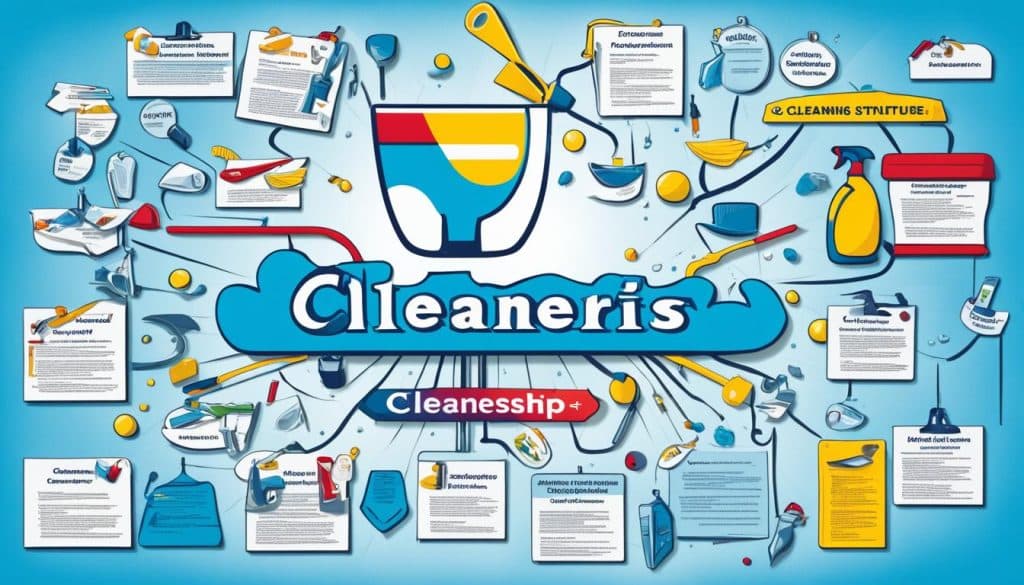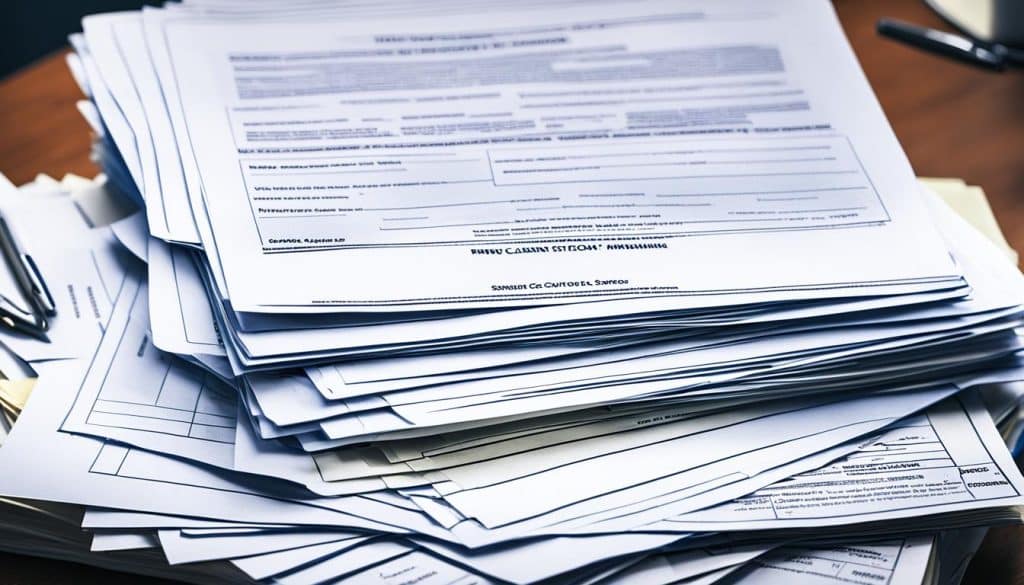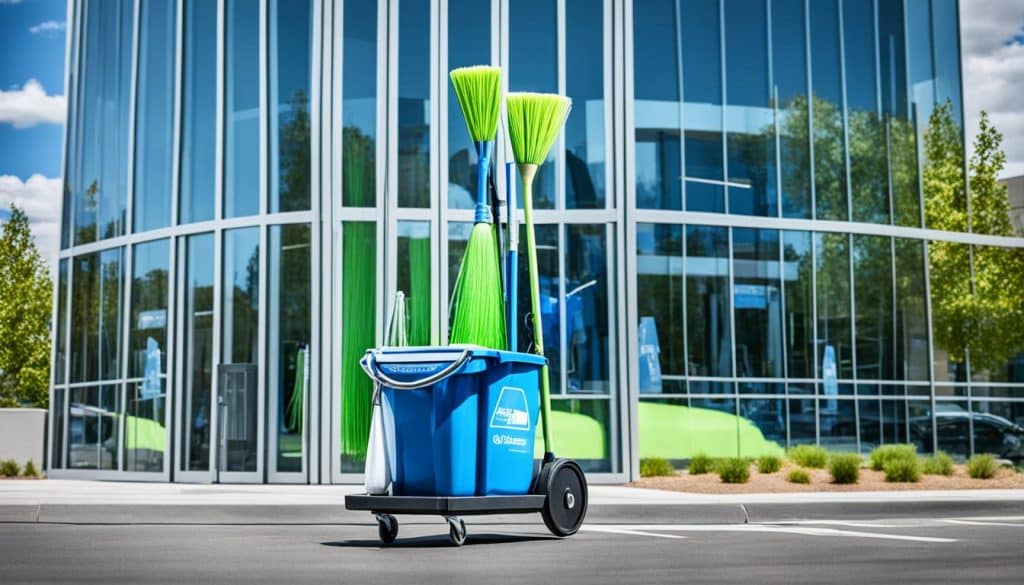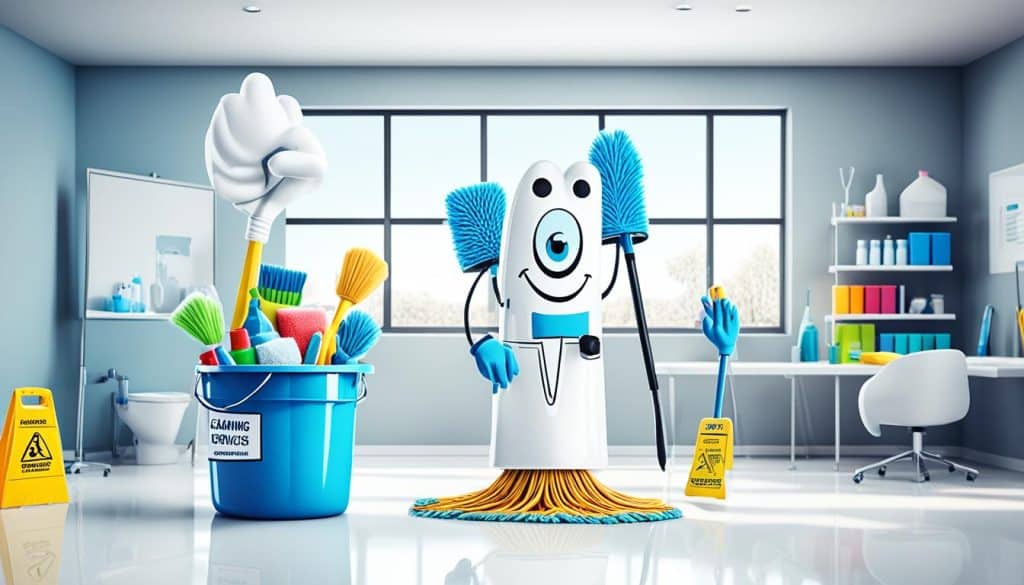Starting a cleaning business in the UK is an exciting journey. But what does it really take to make your dream come true? Are you ready to tackle the challenges and grab the chances that come with a successful cleaning business?
This guide will take you through the key steps to start your dream cleaning business in the UK. We’ll cover everything from understanding the industry to marketing your services well. You’ll get the knowledge and insights you need to succeed.
If you’re a passionate cleaner wanting to move beyond traditional jobs or an aspiring entrepreneur with a cleaning business idea, let’s get started. Let’s explore what it takes to begin and do well in the cleaning industry in the UK.
Key Takeaways:
- Starting a cleaning business in the UK offers exciting opportunities for aspiring entrepreneurs.
- Understanding the industry landscape and conducting thorough research is crucial for success.
- A well-structured business plan is a foundation for your cleaning business.
- Choosing the right business name and legal structure is important for branding and compliance.
- Registering your cleaning business and obtaining the necessary licenses and permits is essential.
Why Start a Cleaning Business?
Starting a cleaning business is driven by many strong reasons. The cleaning industry always needs cleaning services, making it a reliable and possibly profitable choice. It’s perfect for those who want to be their own boss or are looking for a new career.
One big plus of starting a cleaning business is its low start-up costs. You don’t need a lot of training or expensive gear to begin. With a small investment and smart planning, you can start your business fast and efficiently.
Running a cleaning business also means you can set your own hours. You can choose what cleaning services to offer and tailor your business to fit your goals. You can start small or work alone, depending on what you prefer.
The cleaning industry has a wide range of customers. You can clean homes, offices, or any other type of property. This means you can focus on specific customers or serve a wide range, based on your business aims.
Lastly, the joy of helping others is a big reason to start a cleaning business. Cleaning is a must-have service that many people don’t have time for. By offering dependable cleaning services, you can improve people’s lives and help keep your community clean.
If you’re thinking about starting your own business and like cleaning, the cleaning industry is full of great opportunities. It has a steady demand, low start-up costs, flexibility, a variety of customers, and the chance to offer a valuable service. Starting a cleaning business can be both rewarding and fulfilling.
Researching the Cleaning Industry
Before starting a cleaning business, it’s key to research the cleaning industry. You need to understand market trends, customer likes, and the competition.
Look into different parts of the industry like home, business, or special cleaning services. This helps you find the best area for your business. You can then offer services that meet your customers’ needs.
Use industry reports to get important info on market size, growth, and big players. These reports show you the latest trends. They help you make smart choices for your business.
Going to workshops and conferences is also a good idea. These events let you meet industry experts, share ideas, and learn about the best practices.
Knowing what customers want is crucial for a successful cleaning business. Use surveys or focus groups to learn what matters most to them. This info helps you create a unique selling point for your business.
Keep researching to stay ahead in the cleaning industry. By keeping up with trends and customer needs, you can make your business successful for a long time.
Creating a Business Plan for Your Cleaning Business
A well-structured business plan is key for any business, including cleaning services. It acts as a roadmap to help you reach your goals. It covers your vision, target market, marketing, operations, and financial plans.
Start by defining your business vision. Think about what makes your cleaning business stand out. This will help you build a strong brand and draw in customers.
Then, research your target market well. Find out what cleaning services are in demand and match your offerings to them. Know your audience’s needs and preferences to market your services effectively.
Having a solid financial forecast is vital. List your startup costs, like equipment and licenses. Estimate monthly expenses, such as rent and advertising. Also, predict your revenue by looking at market trends and competition.
Include a detailed marketing and sales strategy. Explain how you’ll promote your business and get customers. Use online methods like websites, social media, and SEO.
For operations, decide on your business structure. Will you hire staff or work alone? Outline your training, quality control, and customer service to keep your business running smoothly.
A business plan is crucial for getting funding. It shows investors your business model and how profitable it can be. Prepare an executive summary that highlights your plan’s key points and the ROI for investors.
Remember, a good business plan keeps you focused and helps your business grow. It outlines your goals, strategies, and financial plans. This increases your success chances in the competitive cleaning industry.
Choosing a Business Name and Legal Structure

Starting a cleaning business in the UK means picking a name that fits your brand and appeals to your customers. A good business name makes you stand out and easy to remember. It’s a key step in building your brand.
Think about using keywords that show what your cleaning business does. For example, “eco-clean” or “green” if you focus on eco-friendly services. This attracts customers who care about the planet. Also, make sure the name is simple to say and spell, so people can easily share your business with others.
But picking a name is just the start. You also need to decide on a legal structure for your business. This choice affects many things. Here are some common legal structures:
Sole Trader
A sole trader runs the business alone, with no legal separation from themselves. It’s a popular choice for small businesses because it’s easy to manage and you have full control. It means you handle everything yourself.
Partnership
Starting with one or more partners? Consider a partnership. In this setup, partners share the business’s responsibilities, profits, and risks. Make sure you have a solid agreement that covers everyone’s role and how decisions are made to prevent disagreements.
Limited Company
Choosing a limited company makes your business a legal entity separate from its owners. This can protect your personal assets from business debts. But, it means more paperwork, like filing accounts and tax returns with Companies House.
For advice on the best legal structure, talk to a business advisor or a lawyer. They can help you choose based on your situation and goals.
Deciding on a business name and legal structure is vital for your cleaning business in the UK. Do your homework to find a name that fits your brand. Then, pick a legal structure that matches your business goals and follows the law.
Registering Your Cleaning Business
Registering your cleaning business is key to its legitimacy and trustworthiness. The steps to register vary with the business type you choose. Whether it’s a sole trader, partnership, or a limited company, knowing the legal steps is vital. This ensures you follow the law and boost your business’s trustworthiness.
For sole traders and partnerships, it’s easy to register your cleaning business. You must sign up with HM Revenue & Customs (HMRC) as self-employed or a partnership. You’ll share info like your business name, address, what services you offer, and your details as the owner(s). After registering, you’ll have to follow legal duties, like filing tax returns and keeping track of your earnings and spending.
Choosing a limited company means more steps and rules. You must register with Companies House and submit documents like a memorandum of association and articles of association. This setup protects your personal assets but requires more work and financial reports.
Registering your cleaning business right makes you look good to customers, suppliers, and banks. It shows you’re serious about following the law. It also opens doors to more financial and business chances that unregistered businesses can’t get.
Credibility is crucial for getting customers and deals for your cleaning business. By registering legally and meeting the rules, you lay a strong base for your business’s success.
Benefits of Registering Your Cleaning Business
- Enhances credibility and professionalism
- Complies with legal requirements
- Access to financial services and business opportunities
- Potential tax advantages and deductions
- Protection of personal assets (for limited companies)
Understanding Licensing Requirements for a Cleaning Business

Starting a cleaning business in the UK means knowing the licensing rules. This ensures you follow the law and avoid problems later. By meeting the regulations, you keep your business safe and give your clients peace of mind.
For a basic cleaning business, a general business license might be enough. But, some cleaning services need extra permits or certifications. For instance, pest control services might need a special license.
It’s key to know the specific rules in your area or niche. Licensing rules change a lot across the UK. Do your homework and talk to local authorities or professional groups to understand what licenses you need for your business.
Types of Licenses and Permits
You might need different licenses and permits for your cleaning business, depending on what you do and where you are. Here are some common ones:
- General Business License: This is a basic license needed for any business, including cleaning. It makes sure your business is officially recognized by local authorities.
- Trade Licenses: Some cleaning services, like carpet or window cleaning, need trade licenses. These show you’re an expert in those areas.
- Health and Safety Certifications: Keeping your clients and staff safe is crucial. You might need health and safety certifications to prove you care about safety.
- Environmental Permits: If you use chemicals or hazardous materials, you might need environmental permits. These make sure you handle and dispose of them safely, protecting the environment and public health.
Knowing and meeting the licensing needs for your cleaning business helps you stay legal and gain trust with clients. Showing you follow the rules makes you stand out from others. It shows you’re a reliable and professional service.
Obtaining the Necessary Licenses and Permits
Getting the right licenses and permits is key to starting and running a cleaning business in the UK. These are needed to follow the law and show you’re a trusted service. To get them, you must know what your business needs to comply with.
What you need can change based on where you work and what you do. Always check the rules and talk to experts or local authorities for the latest info.
Think about these things when looking into licenses and permits for your cleaning business:
- Property Use Permits: You might need these from owners, managers, or councils for certain locations.
- Health and Safety Licenses: These are vital for cleaning work. Make sure you follow all health and safety rules, get the right certifications, and train your staff.
- Environmental Permits: If you use chemicals or produce waste, you’ll need these to dispose of things properly and follow environmental laws.
- Insurance: Not a license or permit, but crucial insurance is important. It covers your business and clients against accidents or damage.
Getting the right licenses and permits shows you’re serious about following the law and caring for your clients. It helps build a good name and trust in the cleaning world.
Insurance for Your Cleaning Business

It’s vital to protect your cleaning business, staff, and customers. The right insurance policies are key. Liability insurance is a must-have. It shields your business from financial losses due to property damage or injuries during cleaning.
This insurance covers medical bills, legal fees, and fixing damaged property. It gives you peace of mind and keeps your business financially secure. You might also want to look into other insurance types based on your business’s specifics.
Professional indemnity insurance is a must if you offer special or professional cleaning services. It guards against claims of mistakes or negligence. This insurance covers legal costs, settlements, and damages, protecting your reputation and finances.
Equipment insurance is smart if you use costly tools or machinery. It covers theft, damage, or loss, ensuring your business keeps running.
Vehicle insurance is crucial if you use cars for work. It protects against accidents, theft, and damage. It also covers liability for any injuries or damages your vehicles cause.
Your cleaning business’s insurance needs depend on its size, services, and model. Talking to an insurance expert who knows about cleaning businesses can help you find the right coverage for you.
Hiring Employees or Working as a Solo Cleaner
Starting a cleaning business means deciding if you’ll hire employees or go solo. This choice depends on your goals, how much you can do, and how much people want your services.
Working alone lets you set your own hours and pick the clients you like. You also keep full control over your business. It’s cheaper and simpler than hiring staff, with no need for payroll or training.
But, as your business gets bigger, hiring others might be a good idea. It lets you serve more clients and offer more services. This can help you make more money and grow your business.
Before hiring, learn about the laws and rules for employers. This ensures you follow the law and create a good work place. You’ll need to know about contracts, pay, and workers’ rights.
Switching from solo work to being an employer needs careful thought. It’s a big step with more duties, like managing a team, handling money matters, and training staff.
The choice between hiring or going solo is up to you. Make sure it fits with your business goals and how big you want your cleaning business to be.
Marketing and Promoting Your Cleaning Business

Marketing and promotion are key for a cleaning business’s success. The right strategies can boost brand awareness, draw in new customers, and build a solid reputation.
Creating a strong brand identity is vital. This includes your business name, logo, colors, and overall look. It shows your values, professionalism, and reliability. Keep your brand consistent on your website, social media, and ads.
Social media is crucial in today’s world for promoting your cleaning services. Post engaging content that shows the benefits of your work and your happy customers. Talk to your followers and quickly answer their questions. Think about using paid ads on social media to reach more people and target specific groups.
A professional website is a must for cleaning businesses. It lets potential customers learn about your services, see what others say, and contact you easily. Make sure it’s easy to use, works well on phones, and is good for search engines to get more visitors.
Traditional marketing is still important. Think about ads in newspapers, newsletters, and directories. Giving out flyers and brochures in certain areas can also help. Being part of community events and sponsoring local groups can make your brand more visible.
Offering great service is a top way to promote your business. Always aim for top-quality cleaning that goes beyond what customers expect. Ask happy customers to share their thoughts online, which can help attract more clients. Happy customers telling others about you can really help your business grow.
Marketing and promotion need ongoing effort and keeping up with trends. Check how your marketing is doing and change it as needed for the best results. With a good marketing plan, you can make your cleaning business more visible and successful.
Setting Prices and Managing Finances
Starting a cleaning business means setting the right prices is key. It’s about finding a balance between being competitive and making a profit. This balance is crucial to draw in customers and grow your business.
First, do some market research to see what others charge for cleaning in your area. This tells you what customers expect to pay and helps you set your prices right. Think about the services you offer, the skills needed, and what people in your area are willing to pay for.
When setting your prices, remember to include all the costs of running your business. This includes things like paying your staff, buying cleaning supplies, and covering overheads. This way, you can set prices that are fair for you and still attract customers.
Using accounting software made for small businesses can make managing your money easier. It helps you keep an eye on your income, expenses, and invoices. This makes it simpler to watch your cash flow and keep your records straight for taxes.
Talking to a financial advisor or accountant can also be very helpful. They can give you advice on managing your money well. They can help with making budgets, predicting cash flow, and understanding your financial statements. This can help you make smart choices about your prices and spending.
Good financial management is key to setting competitive prices and making your cleaning business successful in the long run. It’s important to budget well, keep accurate accounts, and watch your finances closely. This approach is vital for steady growth and making a profit.
Resources and Support for Starting a Cleaning Business
Starting a cleaning business can feel daunting, but you’re not alone. Many resources and support networks are ready to help. Groups like the British Cleaning Council and the National Carpet Cleaners Association offer great advice and training. They also provide chances to meet others in the field.
Government and private funding can also help you start your business. These funds can cover things like initial costs, buying equipment, and more. It’s a big help in getting your business up and running.
Online forums, mentorship programs, and business workshops are great for cleaning business owners. They give you important advice and connect you with experts. You can get help with marketing, pricing, or any other business challenge you face. These resources are key to doing well in the cleaning industry.
















